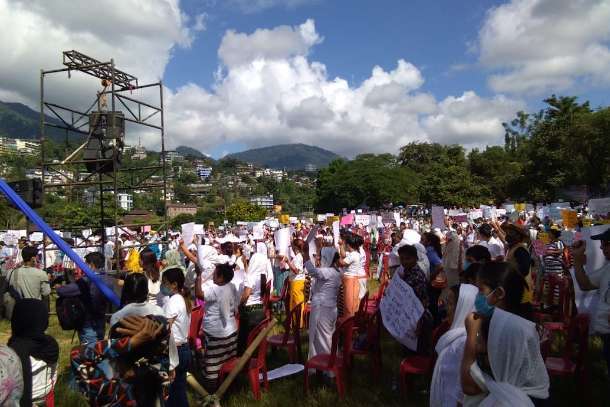Massive Christian protest in India over blocked church refit
Religious places are traditionally constructed on public land in Arunachal Pradesh

More than 10,000 Christians demonstrated in India’s Arunachal Pradesh state on Nov. 2, accusing the government of violating their right to worship by refusing permission to renovate a church.
Christians have been protesting since Oct. 6 when police in Tawang on the India-China border arrested Joseph Singhi, a pastor of Tawang Christian Revival Church, a neo-Christian sect. He was arrested on charges of maintaining a church on government land without permission.
“Right to freedom of religion is our constitutional right. But the state government does not allow us to construct churches. Where can we gather and worship our God?” asked Taw Tebin, who participated in the protest in state capital Itanagar organized by the ecumenical Arunachal Christian Forum (ACF).
He said Christians from all denominations joined the peaceful protest to attract the state’s attention to their grievances. “No other religious community faces restrictions on constructing their religious worship places,” Tebin told UCA News on Nov. 3.
Christian leaders like Tebin say the state government, run by the pro-Hindu Bharatiya Janata Party (BJP), discriminates against Christians, who form the largest single religion in the state.
Christians comprised some 30 percent of the state’s 1.3 million people in 2011. In 2001, they accounted for only 18 percent of the population, official census records show.
Hindus currently form only 29 percent of the population, while the rest belong to several other religions, mostly animist religions.
Hindu groups and the BJP are working to make India a Hindu-only nation and want to resist Christianity’s growth in the state, Christian leaders say.
But the government maintains that the Tawang Christian Revival Church was built on government land and its renovation cannot be allowed because of a 2009 Supreme Court order that banned construction of religious places on public land.
Christians say a small structure has existed since 1999 in Tawang, the seat of a Buddhist monastery and a Buddhist center in the state.
When pastors tried to renovate the church in 2015, some people “created hurdles and continued to keep our files under the carpet,” said Tebin.
Tebin, an ACF member, said most religious structures in Arunachal Pradesh were constructed on government land or common village land and traditionally nobody objected to constructing worship places.
“Now hurdles are created only for Christians when they want to renovate or seek permission for new construction of churches,” he said.
He said a Baptist church that has stood on government land in Tawang since 1997 is facing similar renovation troubles. “There are several such examples of Christians selectively facing restrictions,” he said.
Arunachal Christian Forum president Toko Teki said some people are wrongly presenting it as a Christian-Buddhist confrontation. “It is not. We maintain cordial relations. It is not a confrontation with our Buddhist brothers and sisters,” he said.
Buddhists form 11 percent of the population, a high percentage compared to their national presence of 0.7 percent.
“We have no intention to convert Buddhists and turn Tawang into a Christian district as was being falsely made out,” he asserted.
Following the protest, church leaders said the government had promised to set up an independent high-powered committee to study the grievances.
However, Christian leaders said they would continue the protest.
“It is our constitutional right to have worship places. We are not demanding anything outside the purview of the law of the land,” said Teki.
Father Felix Anthony, spokesman for the Catholic Church in northeastern India, said the government is “stubborn against permitting Christians to construct churches. But not so with other religious groups.”
“We are like others in the state. We should not be discriminated against based on our religious beliefs,” the priest told UCA News on Nov. 3.




